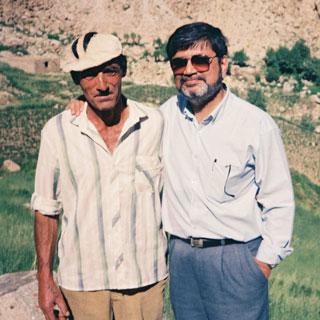Hakim Feerasta, MBA ’74, MPS ’85

Fighting Poverty in Central Asia

When Hakim Feerasta was a senior financial analyst at IBM in Toronto, he was invited to visit the Aga Khan, the spiritual leader of the Ismaili Muslims, at his office outside Paris. Feerasta recalls feeling so excited and nervous he could not sleep the night before the interview. “It’s a singular honor,” he recalls. “If you were a Catholic, it would be like being invited to meet the Pope.”
The Imam, the 49th direct descendent of the Prophet Muhammad, asked Feerasta to become chief executive for Pakistan of the Aga Khan Foundation, a nonprofit international development agency. It was 1978, and the foundation was expanding its work eradicating poverty, hunger, illiteracy, and ill health throughout Asia and Africa. Feerasta, who had been involved in helping Ismailis settle in Canada, accepted the challenge.
After assessing Pakistan’s rural areas, where the average annual income was less than $200, Feerasta convinced the foundation’s leaders to launch a new initiative, the Aga Khan Rural Support Program, which mobilized villagers to organize economic development plans, construct schools, and establish microfinance banks and health care programs. “We needed to do something more to get people out of poverty,” says Feerasta, who was raised in Pakistan. “We needed to put an engine of change in that area or otherwise, for a century, we would be subsidizing that place.”
Although the program improved the income levels, education, and health of millions of people, there were many problems of the rural poor that Feerasta did not understand. So he decided to return to Cornell on a year-long sabbatical to earn a master’s degree in professional studies in International Development and Planning.
After 16 years in Pakistan, Feerasta became the foundation’s CEO and the first resident representative of the Aga Khan Development Network (AKDN) in Tajikistan, a country that had nearly collapsed after the breakup of the Soviet Union. Among its most important accomplishments, the AKDN, which brought together the Aga Khan Foundation and several related agencies, completed the construction of a hydropower plant under a groundbreaking, public-private partnership involving support from the World Bank, the Swiss government, and the AKDN’s Fund for Economic Development. “It brought reliable electricity to 110,000 people,” Feerasta says, adding that those residents previously only had four hours of electricity a day.
“I wanted to pay back for as long as I could,” he says. “I went for three years, and it turned into 30 with the ADKN. It was just very exciting to see what little things I could do make a difference in the lives of millions of people.” In 2008, Feerasta retired, and now teaches financial management for international development part-time at the Humber College School of Business in Toronto.
